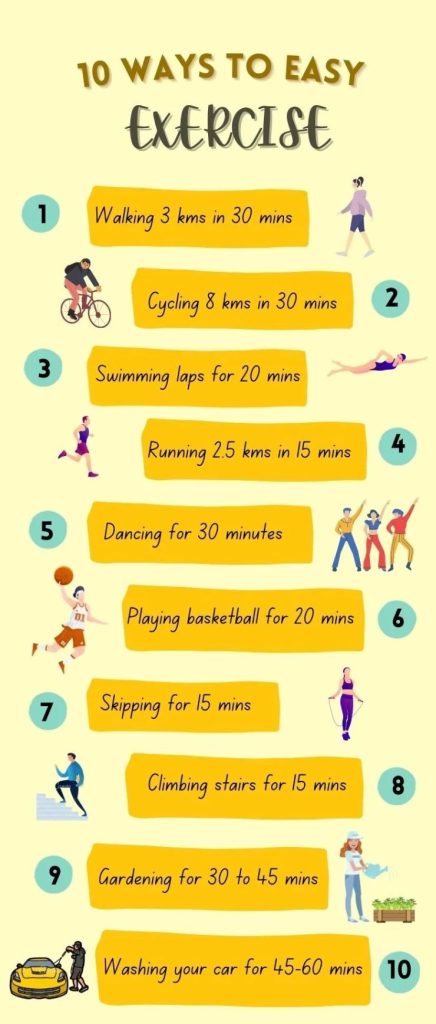Στον σύγχρονο κόσμο μας, γεμάτο τεχνολογία και πολυάσχολα προγράμματα, η παραμονή στην ενεργό δράση μπορεί μερικές φορές να αποτελεί πρόκληση. Οι ευκολίες της σύγχρονης ζωής, ενώ κάνουν τη ζωή μας ευκολότερη, συχνά μας οδηγούν στο να είμαστε λιγότερο σωματικά δραστήριοι. Αυτή η έλλειψη κίνησης δεν είναι μόνο κακή για το σώμα μας- μπορεί επίσης να επηρεάσει την ψυχική μας υγεία, οδηγώντας σε αυξημένο άγχος και χαμηλότερα επίπεδα ενέργειας.
Αλλά υπάρχουν καλά νέα - η μετακίνηση μπορεί να κάνει τεράστια διαφορά και ποτέ δεν είναι αργά για να ξεκινήσετε. Η άσκηση είναι ένα ισχυρό εργαλείο που μπορεί να ενισχύσει την υγεία, τη διάθεση και τα επίπεδα ενέργειάς σας. Σε αυτό το ιστολόγιο, θα μοιραστούμε πέντε βασικούς λόγους για τους οποίους πρέπει να κάνετε την άσκηση τακτικό μέρος της ζωής σας. Είτε θέλετε να μειώσετε το άγχος, να βελτιώσετε την υγεία σας ή να ενισχύσετε την ενέργειά σας, η άσκηση μπορεί να σας βοηθήσει να επιτύχετε τους στόχους σας.
Η άσκηση έχει πολλά οφέλη τόσο για τη σωματική όσο και για την ψυχική υγεία και μπορεί να μειώσει αποτελεσματικά το στρες και το άγχος. Η τακτική σωματική δραστηριότητα έχει αποδειχθεί ότι βελτιώνει τη διάθεση και μειώνει τα συναισθήματα του στρες, του άγχους και της κατάθλιψης. Μπορεί επίσης να βελτιώσει τον ύπνο, ο οποίος συχνά διαταράσσεται από το άγχος και το στρες.
Η άσκηση μπορεί να βοηθήσει στη μείωση του στρες και του άγχους με διάφορους τρόπους. Μπορεί:

1. Απελευθέρωση ενδορφινών
Η άσκηση μπορεί να απελευθερώσει ενδορφίνες, οι οποίες είναι χημικές ουσίες στον εγκέφαλο που δρουν ως φυσικά παυσίπονα και ανεβάζουν τη διάθεση. Οι ενδορφίνες είναι νευροδιαβιβαστές που παράγονται από τον οργανισμό και απελευθερώνονται ως απάντηση σε ορισμένα ερεθίσματα, όπως η άσκηση, το γέλιο ή το στρες. Αναφέρονται μερικές φορές ως χημικές ουσίες "ευεξίας" επειδή μπορούν να προκαλέσουν αισθήματα ευφορίας και ευεξίας.
2. Απόσπαση της προσοχής από τις ανησυχίες
Όταν γυμνάζεσαι, είναι δύσκολο να σκεφτείς οτιδήποτε άλλο. Αυτό μπορεί να είναι ένας χρήσιμος αντιπερισπασμός από τις ανησυχίες και να σας δώσει ένα διάλειμμα από τη φλυαρία, ένα συνηθισμένο σύμπτωμα του άγχους.
3. Βελτίωση της αυτοεκτίμησης
Η άσκηση μπορεί να βελτιώσει την αυτοεκτίμηση και την εικόνα του σώματος, γεγονός που μπορεί να είναι χρήσιμο για άτομα που αγωνίζονται με άγχος ή χαμηλή αυτοεκτίμηση.
4. Παρέχουν μια αίσθηση ολοκλήρωσης
Η άσκηση μπορεί να προσφέρει μια αίσθηση επιτυχίας και να ενισχύσει την αυτοπεποίθηση, κάτι που μπορεί να είναι χρήσιμο για άτομα που παλεύουν με άγχος ή χαμηλή αυτοεκτίμηση.
Η ενσωμάτωση της τακτικής σωματικής δραστηριότητας στην καθημερινή σας ρουτίνα μπορεί να επηρεάσει θετικά τη συνολική σας ευεξία και μπορεί να αποτελέσει έναν αποτελεσματικό τρόπο διαχείρισης του στρες και του άγχους. Είναι σημαντικό να βρείτε μια δραστηριότητα που σας αρέσει και που είναι διαχειρίσιμη για το τρέχον επίπεδο φυσικής σας κατάστασης.
Η άσκηση δεν είναι μόνο για την ανάπτυξη μυών- είναι μια πύλη προς έναν πιο υγιή, αναζωογονημένο εαυτό. Οι τακτικές προπονήσεις δυναμώνουν την καρδιά σας, ενισχύοντας την αποδοτικότητα και την αντοχή της. Η καρδιαγγειακή σας υγεία παίρνει ώθηση, μειώνοντας τον κίνδυνο καρδιακής νόσου και εγκεφαλικού επεισοδίου. Αλλά τα οφέλη δεν σταματούν εδώ.
Η άσκηση είναι ένας φυσικός ρυθμιστής της αρτηριακής πίεσης και της χοληστερόλης. Αυξάνει την "καλή" HDL χοληστερόλη, βοηθώντας στην εξάλειψη της "κακής" LDL χοληστερόλης από τον οργανισμό σας. Αυτή η ισορροπία αποτελεί ακρογωνιαίο λίθο στη διατήρηση ενός υγιεινού για την καρδιά τρόπου ζωής.
Ο πόλεμος κατά της παχυσαρκίας βρίσκει έναν ισχυρό σύμμαχο στην τακτική σωματική δραστηριότητα. Η άσκηση καίει θερμίδες και χτίζει μυς, που έχουν καθοριστική σημασία για τη διαχείριση και τη μείωση του βάρους. Είναι επίσης φύλακας κατά του διαβήτη τύπου 2, ενισχύοντας την ευαισθησία στην ινσουλίνη και εξασφαλίζοντας ότι τα επίπεδα σακχάρου στο αίμα είναι υπό έλεγχο.
Σε έναν κόσμο όπου η ενέργεια είναι νόμισμα, η άσκηση είναι ένα εργαλείο δημιουργίας πλούτου. Δεν αφορά μόνο τη σωματική ζωτικότητα, αλλά και την πνευματική ευρωστία. Οι τακτικές προπονήσεις ενισχύουν την καρδιαγγειακή υγεία, πλημμυρίζουν τον οργανισμό σας με ενδορφίνες και διαλύουν το άγχος, με αποκορύφωμα μια δεξαμενή ενέργειας που τροφοδοτεί την ημέρα σας.
Με ενισχυμένη ενέργεια, κάθε εργασία γίνεται διαχειρίσιμη, κάθε πρόκληση ξεπεραστή. Αποτελεί καταλύτη για μια θετική διάθεση, μειώνοντας την κούραση και την ευερεθιστότητα και ανοίγοντας το δρόμο για μια ζωή που βλέπεται μέσα από ένα φακό αισιοδοξίας και δυνατοτήτων.
Τα υγιή επίπεδα ενέργειας είναι συνυφασμένα με την ποιότητα του ύπνου και τις ισχυρές σχέσεις. Η άσκηση, με τον μαγικό της τρόπο, ενισχύει και τα δύο, εξασφαλίζοντας ότι κάθε στιγμή που είστε ξύπνιοι ζείτε στο έπακρο και κάθε αλληλεπίδραση εμπλουτίζεται από την αναζωογονημένη παρουσία σας.
Ο εγκέφαλος, ένα θαύμα της ανθρώπινης ανατομίας, δεν έχει ανοσία στη διαδικασία της γήρανσης. Ωστόσο, η άσκηση αποτελεί μια τρομερή άμυνα, ενισχύοντας τη μνήμη και τις γνωστικές ικανότητες. Κάθε προπόνηση αυξάνει τη ροή του αίματος προς τον εγκέφαλο, ένα θρεπτικό ρεύμα που υποστηρίζει τη βέλτιστη λειτουργία και αποκρούει εκφυλιστικές καταστάσεις.

Οι νευροτροφικοί παράγοντες, οι πρωτεΐνες που φροντίζουν τον εγκέφαλο, ενισχύονται με την τακτική σωματική δραστηριότητα. Είναι οι φύλακες των εγκεφαλικών κυττάρων, υποστηρίζοντας την ανάπτυξη και τη μακροζωία, και προσφέροντας μια ασπίδα ενάντια στην παρακμή που σχετίζεται με την ηλικία.
Η διάθεση, το άγχος, το στρες - δεν είναι απλώς συναισθηματικές καταστάσεις, αλλά παράγοντες που επηρεάζουν την υγεία του εγκεφάλου. Η άσκηση είναι ένας ρυθμιστής, ένας ισορροπιστής που εξασφαλίζει ότι αυτοί οι παράγοντες συμβάλλουν θετικά στη γνωστική λειτουργία. Προσθέστε στο μείγμα και τη βελτίωση του ύπνου και έχετε μια συνταγή για έναν εγκέφαλο που όχι απλώς επιβιώνει, αλλά ευδοκιμεί.
Η έναρξη ενός ταξιδιού γυμναστικής είναι μια προσωπική εμπειρία που διαπλέκεται με την καθημερινή μας ζωή, επηρεάζοντας όχι μόνο τη σωματική μας ευεξία αλλά και την ψυχική και συναισθηματική μας κατάσταση. Σε αυτή την ενότητα, θα εξερευνήσουμε τον αναπόσπαστο ρόλο της διατροφής, θα αντλήσουμε έμπνευση από πραγματικές ιστορίες γυμναστικής και θα αντιμετωπίσουμε κοινές προκλήσεις που αντιμετωπίζουμε στην πορεία.
Η ισορροπημένη διατροφή είναι ο αφανής ήρωας που ενισχύει τα οφέλη της άσκησής σας. Δεν είναι μόνο οι προπονήσεις αλλά και το τι καταναλώνετε που μετράει. Η διατροφή και η άσκηση είναι συνεργάτες στο έγκλημα, που δουλεύουν χέρι-χέρι για να ανεβάσουν τα επίπεδα ενέργειάς σας, να ενισχύσουν την αποκατάσταση των μυών και να ενισχύσουν τη συνολική απόδοση. Η ενσωμάτωση μιας ποικιλίας θρεπτικών συστατικών, από πρωτεΐνες που βοηθούν στην αποκατάσταση των μυών μέχρι υδατάνθρακες που αναπληρώνουν τις αποθήκες ενέργειας, καθώς και βιταμίνες και μέταλλα που υποστηρίζουν μυριάδες σωματικές λειτουργίες, είναι απαραίτητη. Θυμηθείτε, το θέμα είναι να δημιουργηθεί μια συνέργεια όπου η διατροφή σας συμπληρώνει τη σωματική σας δραστηριότητα, ενισχύοντας η καθεμία τον αντίκτυπο της άλλης.

Στο ταξίδι προς τη βέλτιστη φυσική κατάσταση, η κατανόηση του ρόλου της διατροφής είναι ζωτικής σημασίας. Κάθε μπουκιά που παίρνετε μπορεί είτε να τροφοδοτήσει την πρόοδό σας είτε να την εμποδίσει. Για παράδειγμα, οι πρωτεΐνες δεν είναι απαραίτητες μόνο για την αποκατάσταση των μυών, αλλά και για την ανάπτυξη νέων μυϊκών ιστών. Οι υδατάνθρακες, συχνά παρεξηγημένοι, είναι ζωτικής σημασίας, καθώς παρέχουν την ενέργεια που απαιτείται για να ανταπεξέλθετε στις προπονήσεις. Τα λίπη, ειδικά τα υγιή, παίζουν ρόλο στη ρύθμιση των ορμονών, συμπεριλαμβανομένων εκείνων που εμπλέκονται στη μυϊκή ανάπτυξη. Η ενυδάτωση, επίσης, δεν μπορεί να αγνοηθεί. Το νερό υποστηρίζει κάθε μεταβολική διαδικασία, συμπεριλαμβανομένης της παραγωγής ενέργειας και της αποβολής αποβλήτων.
Έτσι, η υιοθέτηση μιας ολοκληρωμένης διατροφής είναι σαν να εφοδιάζετε τον εαυτό σας με τα απαραίτητα εργαλεία για να αποκτήσετε την καλύτερη δυνατή φυσική σας κατάσταση, εξασφαλίζοντας ότι κάθε προπόνηση δεν θα αφορά μόνο την καύση θερμίδων αλλά και την οικοδόμηση ενός ισχυρότερου, υγιέστερου εαυτού.
Ωστόσο, ο δρόμος προς τη γυμναστική δεν είναι χωρίς εμπόδια. Οι χρονικοί περιορισμοί, τα μειωμένα κίνητρα ή ακόμη και η αβεβαιότητα για το πού να ξεκινήσετε μπορεί να αποτελέσουν εμπόδια. Το κλειδί είναι να προβλέψετε αυτές τις προκλήσεις και να οπλιστείτε με στρατηγικές για να τις ξεπεράσετε. Δημιουργήστε ένα χρονοδιάγραμμα, θέστε ρεαλιστικούς στόχους και θυμηθείτε ότι πρόκειται για ένα ταξίδι προόδου, όχι τελειότητας. Αν ο χρόνος είναι περιορισμός, επικεντρωθείτε σε σύντομες, έντονες προπονήσεις. Αν τα κίνητρα μειώνονται, θυμηθείτε τις ιστορίες της Σάρα και του Άλεξ και να ξέρετε ότι κάθε βήμα που κάνετε είναι ένα βήμα πιο κοντά σε έναν πιο υγιή και ευτυχισμένο εαυτό.
Πηγές:
1. https://www.nhs.uk/live-well/exercise/
2. https://www.healthline.com/health/fitness-exercise/10-best-exercises-everyday
3. https://www.nih.gov/news-events/nih-research-matters/understanding-how-exercise-affects-body

Πνευματικά δικαιώματα 2024 © Mountaindrop. Όλα τα δικαιώματα διατηρούνται. Powered by EOSNET









